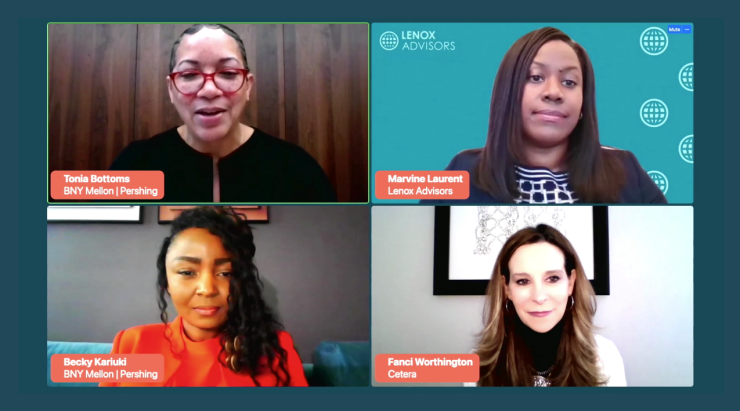From lack of understanding to having the wrong educational background, there is a long list of go-to explanations offered up for why women and people of color
But are those reasons fact, fiction or simply
Led by
Bottoms, a managing director and senior managing counsel for BNY Mellon | Pershing, was joined on the panel by BNY Mellon | Pershing Director and Business Development Officer
Jumping into the conversation, Bottoms asked the women to discuss the myth of needing to deeply understand jobs within financial services before pursuing one.
Bottoms believes her own success, like the success of
"I think there's this perception that everyone needs to be a broker. Or on a trading desk. Or they have to be doing some sort of sales to be in financial services. And I, myself, am a great example of that mythbuster," Bottoms said. "I'm a lawyer by background. And I don't think I could have described in law school the job that I have today. And so the opportunities across financial services … the aperture is so much wider than I think people assume."
Worthington, who was introduced to the financial field in the third grade while cleaning up around her parent's firm, formally entered the business in 1999. Despite being on the sales side for 25 years, she said she is an entrepreneur at heart, and selling is just one part of the job.
And for anyone claiming that there is only one way to strive in this industry, Worthington had a simple message:"Don't believe the hype."
"You don't have to be a statistics major to do a lot of the roles that are inside of financial services. And it's a wonderful business for women to be in. I think, personally, we're very good as financial advisors, and I also think that we're very good at being able to communicate in a way that many people can understand," she said. "It's such a great field to be in and it gets kind of a bad rap out there for being this one-sided thing (where) you have to be a math major. I wasn't a math major. I was a theater major.
"So you don't have to be this math genius to be in financial services," she continued. "And you also don't have to be in sales if you don't want to be. But if you do want to be in sales, you have this avenue that is just fantastic for women. And for anybody that's ever experienced barriers, you overcome those yourself. There's no one stopping you from overconfidence."
Another myth addressed during the panel was the idea that achieving success in business and having a positive impact on your community cannot coexist, as if one or the other has to be chosen.
In debunking that myth, Kariuki explained that issues like the COVID pandemic, civil unrest and the ongoing economic downturn have exposed inequality as a systematic risk.
"And I'm sure all of us in this room have experienced the impact of one of those elements in some form or another. The good news is we, and when I say we I mean financial institutions, are uniquely positioned to have a sizable impact on many of these social challenges because of our critical role in society," she said, adding that the work they do can directly impact the ability of people to manage money, build wealth and change lives for the better across the globe.
"And sure, we do this because it's the right thing to do. But there's also a compelling business case for creating solutions to address issues that impact the community," Kariuki said. "I mentioned that I'm originally from Kenya and fintech has really changed the game in Africa. To an extent that may surprise a lot of people in this room. The majority of the population in Kenya today, including in the most remote parts of the country, manage the majority of their financial transactions on an app (and) as long as you have a smartphone, you have access to purchase goods and services.
"That's opened up a world of access to people who would otherwise be unbanked. So we can absolutely bust that myth today to say that not only do we have a strong business case here to positively impact the community, but we are doing it."
In busting the myth that one must have a specific educational background or come from a top Ivy to make it in wealth management, Laurent said skill set will always trump who handed you your diploma or what area of study is written on it.
"It's about bringing a spirit of excellence and just lifelong learning. The certifications can come in the willingness to go out and learn something else," she said. "I was speaking to our recruiter about this, and she mentioned … that she's seen everything from retail individuals to personal trainers and teachers and lawyers who have come into this profession."
Laurent said she also leanred that for many employers, your education is not the end all be all.
"They were having (candidates) fill out these attribute forms because that was more important than the experience forms in looking for that transferable skill set," she said. "So I think that we can say you don't have to come from an Ivy League (and) you don't have to have a finance degree to work. Whether it's in a supporting role or even client facing."
Diversitas has held three in-person events on the University of Akron campus. In 2020, the first national Diversitas Symposium held online attracted 22 partner universities, five corporate sponsors and more than 600 attendees.
Other issues tackled during the 2023 event included addressing the different paths that can lead to a flourishing career in wealth management and how to successfully navigate the industry once you've broken through.








